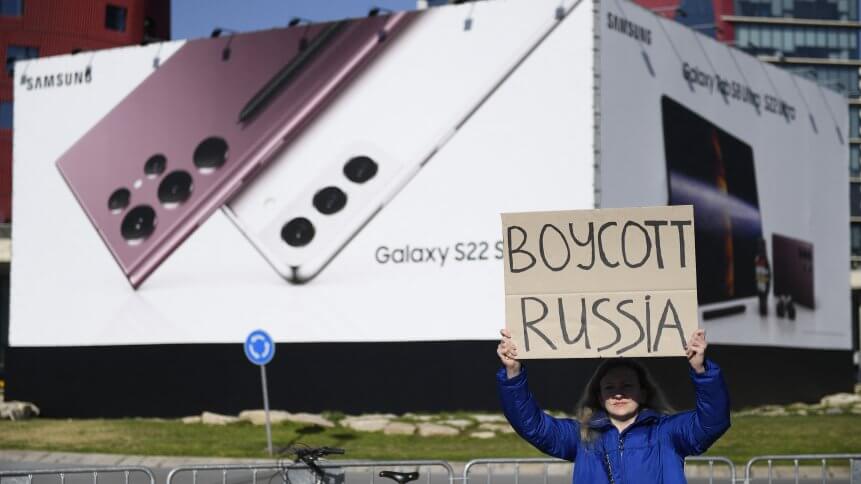Here’s the technology companies severing ties with Russia

- Technology giants from Apple to Netflix and Nokia to Ericsson have announced sanctions on Russia.
- Payment and fintech outfits Visa, Mastercard, Remitly, and Wise all announced limits imposed on Moscow
Last week, the US and its allies took steps to impose severe economic sanctions on Russia in response to President Vladimir Putin’s attack on Ukraine. The economic penalties were meant to cripple the economy of Russia, its financial institutions, and its access to technology. Since then, announcements from organizations, brands and even digital services have been trickling in, revealing decisions to cut off the world’s largest country by landmass.
For context, Russia’s IT market is one of the world’s largest in size and has “significant potential,” according to the US International Trade Administration’s report this past October. The US is also a “leading supplier” of IT products to Russia. Companies like Google, Apple, IBM, Cisco, Oracle, Intel, Dell, and HP are among US participants in the Russian market, the Trade Administration said.
Let’s take a look at the list of technology giants that have imposed some sort of sanctions against Russia.
Apple: Halting all product sales in Russia
One of the more recent incidents to occur over Moscow’s invasion of Ukraine is from Apple. The the world’s most valuable brand announced a halt in all product sales in Russia. “We have paused all product sales in Russia. Last week, we stopped all exports into our sales channel in the country,” said an Apple statement.
The iPhone maker also announced that its services including digital payment option Apple Pay have been limited, while Russian state-owned media RT and Sputnik news apps were no longer available for download outside Russia. The company has also disabled in Ukraine both traffic and “live incidents” reporting in Apple Maps as a safety measure for Ukrainian citizens.
“We are deeply concerned about the Russian invasion of Ukraine and stand with all of the people who are suffering as a result of the violence. We are supporting humanitarian efforts, providing aid for the unfolding refugee crisis,” the statement added.
The move came soon after Ukraine’s defiant government, which has urged its people to battle Russian forces, has asked for help from all quarters, including Apple’s CEO Tim Cook. “I appeal to you.. to stop supplying Apple services and products to the Russian Federation, including blocking access to the Apple Store!” Ukraine’s digital minister Mykhailo Fedorov wrote in a letter he posted to Twitter on Friday.
Financial technology firms Remitly, Wise suspend services in Russia
Formerly known as TransferWise, Wise is a public fintech startup that originally started as a remittance company but has since expanded into payment services, equity investments, and foreign exchange.
However, when the US and its allies announced they would take action against Russia’s central bank and ban some of the country’s banks from the SWIFT international payments system, Wise realized it was going to be tough to proceed with business as usual in Russia.
Hence came the decision to suspend operations in Russia following Wise’s previous move to limit daily transfers to Russia to £200. A spokesperson for London-based Wise told Reuters that it will continue to monitor the situation and “keep these measures under constant review.”
Separately, a spokesperson for Remitly confirmed with Reuters that Remitly had also stopped supporting money transfers to Russia due to the new sanctions.
Netflix: No more state-run channels for its Russian services
In Russia, there is a regulation that would require Netflix as a streaming service to distribute state-backed channels. When Politico first reported that Netflix, which launched its service in Russia in October 2020, would fall under the Russian regulations, it emphasized that the new rules require compliance starting March 1.
The regulations are overseen by Russia’s communications regulator Roskomnadzor and require audiovisual platforms with over 100,000 subscribers like Netflix to distribute 20 free-to-air news, sports and entertainment channels in that country.
But given the current circumstances, Netflix Inc said this week that for now, it has no plans to add state-run channels to its Russian service. “Given the current situation, we have no plans to add these channels to our service,” a Netflix spokesman stated in a statement, with the “current situation” being Russia’s invasion of Ukraine.
Ericsson, Nokia halt technology deliveries to Russia
Complying with sanctions imposed on Russia, Nokia too decided to stop deliveries of networking equipment and infrastructure to Russia, the Finnish network equipment maker said on Tuesday. “This is a complex situation which is evolving rapidly and we continue to assess it”, the company, which supplies MTS, Vimpelcom, Megafon and Tele2 in Russia, told Reuters.
Also since both the US and the EU sanctioned semiconductor, telecommunications equipment, and other technology sales to Russia, Swedish telco Ericsson jumped on the bandwagon and suspended deliveries to Russia. “We are now urgently reviewing how our business might be affected by the events and the sanctions imposed,” CEO Borje Ekholm said in an internal memo seen by Reuters.
Visa, Mastercard blocked Russia from their networks
The US even placed a number of Russian individuals and financial institutions on a sanctions list called the Specially Designated Nationals list last week. It effectively blocks US companies and people from doing business with any individual or entity on that list. Washington went to the extent of sanctioning Russia’s central bank earlier this week.
The moves led payment and credit card giants Visa and Mastercard to block Russian financial institutions from their networks. On Monday, February 28, Mastercard said it had “blocked multiple financial institutions” from its payment network, without naming companies or individuals. “We will continue to work with regulators in the days ahead to abide fully by our compliance obligations as they evolve,” the company added.
Its rival Visa also blocked those on the sanctions list, saying the next day that it was “taking prompt action to ensure compliance with applicable sanctions, and are prepared to comply with additional sanctions that may be implemented.”
With additional reporting by © Agence France-Presse










